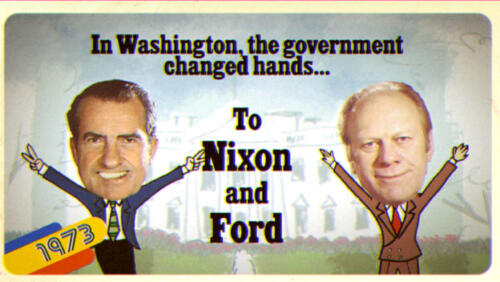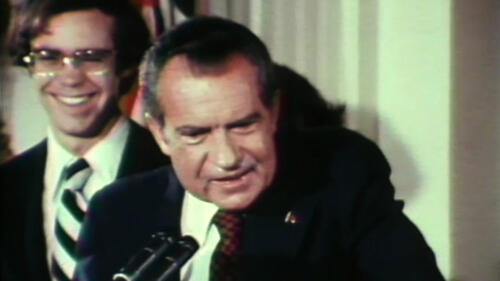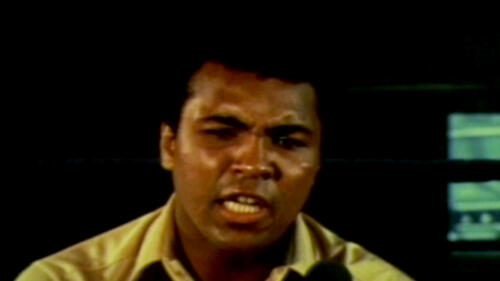1970s
The 1970s marked an era when the women's rights, gay rights and environmental movements gained momentum. The Watergate scandal led to the resignation of President Richard Nixon, the U.S. ended direct involvement in the Vietnam War and President Jimmy Carter grappled with an energy crisis, inflation and the Iran Hostage Crisis.
Featured Overview
The 1970s are famous for bell-bottoms and the rise of disco, but it was also an era of economic struggle, cultural change and technological innovation.

Featured Overview
The 1970s are famous for bell-bottoms and the rise of disco, but it was also an era of economic struggle, cultural change and technological innovation.
Start Here

Trace the milestones of a scandal that rocked the nation.

The U.S. energy crisis of the 1970s forced American leaders and researchers to come up with solutions in policymaking, technology and architecture.

The first African American to seek the nomination of a major party competed against George Wallace, the face of Southern segregation.

The groundbreaking gender equity law made a lasting impact by increasing the participation of girls and women in athletics.
Iran Hostage Crisis
Iran Hostage Crisis
Explore the chain of events that set off the Iran hostage crisis - an diplomatic standoff that would keep Americans on edge and shape the course of Jimmy Carter’s presidency.
4:14 watch
3 Key 1970s Movements
Explore All Related Topics

Billy Joel’s music offers a soundtrack to America’s changing landscape.

The phenomenon started as a practical way to get places, then it became cool.

On August 20, 1975, Viking 1 was launched to Mars and approximately 10 month later, it relayed its first images from the Red Planet. Those images revealed a desert-like world—and hints of possible life.

It wasn't just a hit—it changed how Hollywood does business.

Yacht rock, while defined more than two decades later, offered a break from the politically charged era of the 1960s and early '70s.

In September 1975, President Gerald Ford escaped two attempts on his life—both by women and both in California.

A 1975 work of fiction included enough real-life references to turn New York socialites against Truman Capote.

After serving 52 months in jail, Liddy won a pardon from President Carter and launched a career in publishing and TV.

Meir earned the title, in part, because of her steely leadership during the 1973 Yom Kippur War.

Ever since the US overthrew the Hawaiian monarchy in an illegal coup, Native islanders responded with protest, activism and expressions of cultural pride.

'Pong,' 'Space Invaders' and 'Pac-Man' helped spawn a juggernaut industry.

The U.S. energy crisis of the 1970s forced American leaders and researchers to come up with solutions in policymaking, technology and architecture.

Ford's 'Whip Inflation Now (WIN)' effort tried to tamp down inflation with a collective, can-do approach. It didn't work out.

Mitchell, the wife of Richard Nixon's attorney general, alleged she was held hostage and drugged after she attempted to talk to the press.

When an Uruguayan rugby team crashed in the Andes on October 13, 1972, cannibalism helped some survive two months in harsh conditions.

The Munich Massacre was an attack during the 1972 Summer Olympics in Munich, West Germany, by eight members of the Palestinian terrorist group Black September. The terrorists took nine members of the Israeli Olympic team hostage, after killing two of them. The remaining hostages were later killed during a botched rescue attempt.
Environmental issues have long faced our planet, but what did it finally take to set aside a day just for Earth?

Representative Jordan's primetime remarks on the Constitution riveted the nation and underscored the grave role of serving as a check on the executive branch.
In 1974, two journalists brought down President Nixon by uncovering the Watergate scandal. Crucial to their story was a whistleblower.

More than a quarter of the nation was inoculated in 1976 for a pandemic that never materialized.

In the summer of 1978, the S.S. America sent passengers over the edge.

Rodney Alcala won a 1978 episode of 'The Dating Game' in the middle of a murder spree.

Panic set in after the partial nuclear meltdown as the public tried to decide which story to trust—and whether to evacuate.

Carter's executive order left many people furious, while others saw it as a bold show of compassion.

The strike started when one driver, mad as hell about the OPEC oil crisis, turned off his engine and got on his CB radio.

The first African American to seek the nomination of a major party competed against George Wallace, the face of Southern segregation.

Passage of the ERA seemed like a sure thing. So why did it fail to become law?

Chilling audiotapes tell the story of the Jonestown massacre.

The over 900 deaths in Guyana under cult leader Jim Jones were more mass murder than suicide.

Trace the milestones of a scandal that rocked the nation.

There are many reasons, but part of the explanation comes down to timing.

If not for the former White House counsel, Nixon might never have resigned.

Nixon wanted to send a message to “the Angela Davis crowd.”

The protestors helped themselves to the editor's cigars and would not budge from his office.

After President Nixon refused to release his secret tapes, Congress ruled that they were the government’s property, not his.

The mystery van had a few key details that were fundamental in tracking its origin.

Some 3,000 hours of secret tapes from President Nixon have been released, but only a small percentage has been published. Here are some moments.

Knievel’s last leap in the spotlight was a 'Jaws'-inspired gimmick.

Former FBI deputy director William Mark Felt broke his 30-year silence and confirmed in 2005 that he was “Deep Throat,” the anonymous government source who helped take down President Nixon in the Watergate scandal.

It was police, not politicians, who misled the public in 1975.

420 doesn’t begin with the police, but rather in the 1970s with a group of students in California.

From the Hutchinson Papers to the Pentagon Papers to WikiLeaks, look back at some of the most significant leaks in history and their impact.

The Foreign Intelligence Surveillance Act was designed to prevent secret surveillance by the president and others.

In 1974, Richard Nixon became the first president to resign from office. Here's how his final hours in the White House unfolded.

The arrival of the National Zoo’s first giant pandas in 1972 marked a new chapter in U.S.-China relations.

An attack by President Nixon on his own Justice Department came with grave consequences.

How a six-day hostage drama inside a Swedish bank christened the psychological phenomenon known as "Stockholm Syndrome."

Explore some interesting facts you may not know about the 38th U.S. president, Gerald R. Ford.

Find out what happened to some of the key players in the historical scandal that brought down a U.S. president.
In this History Rocks the 70's video, brought to you by the History Channel, learn about special investigator Archibald Cox's quest to investigate the Watergate cover-up. Nixon tries to get Cox fired several times. He asks Attorney General Elliot Richardson and Deputy Attorney General Ruckelshaus; both refuse and resign.
Richard Nixon's personality and character issues may have led to his involvement in the Watergate scandal.
The 1970s are famous for bell-bottoms and the rise of disco, but it was also an era of economic struggle, cultural change and technological innovation.
Travel back in time to 1974 and listen to Muhammad Ali talk about his upcoming "Rumble in the Jungle" bout with George Foreman.
A seemingly random robbery at a Washington, D.C. building leads to the first presidential resignation in American history.

An oil embargo imposed by members of the Organization of Arab Petroleum Exporting Countries (OAPEC) led to fuel shortages and sky-high prices throughout much of the 1970s.

The 1970s brought social change in the battles for women's and gay rights, along with the launch of an environmental movement and a new conservative populism.

Three Mile Island is the site of a nuclear power plant in Pennsylvania which experienced the worst commercial nuclear accident in U.S. history in 1979.

A June 1972 break-in to the Democratic National Committee headquarters led to an investigation that revealed multiple abuses of power by the Nixon administration.














